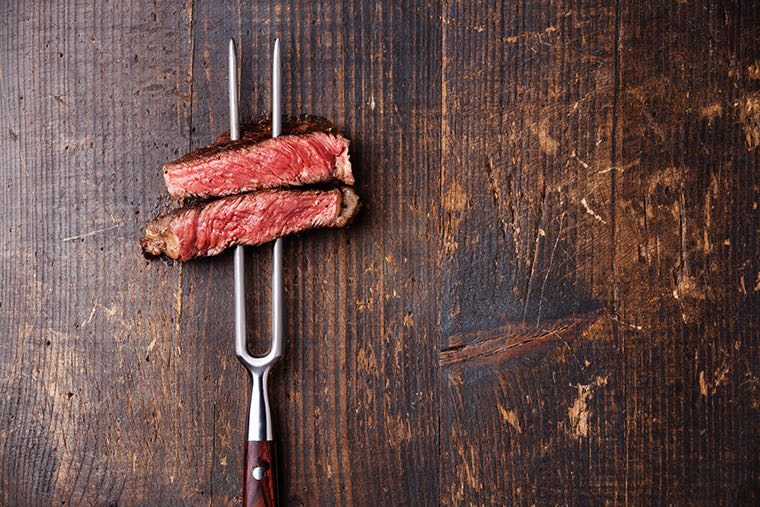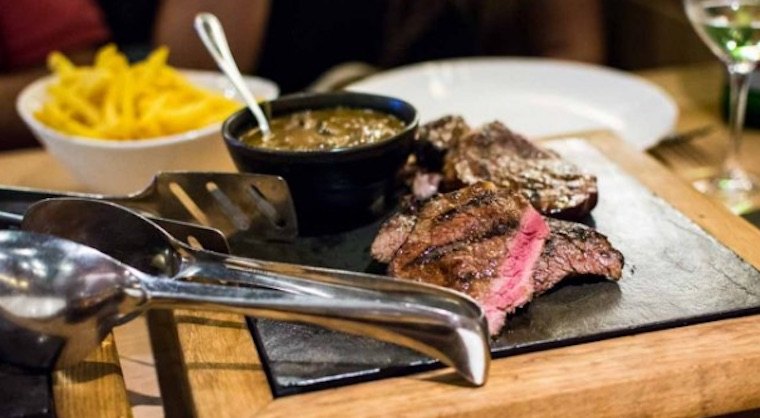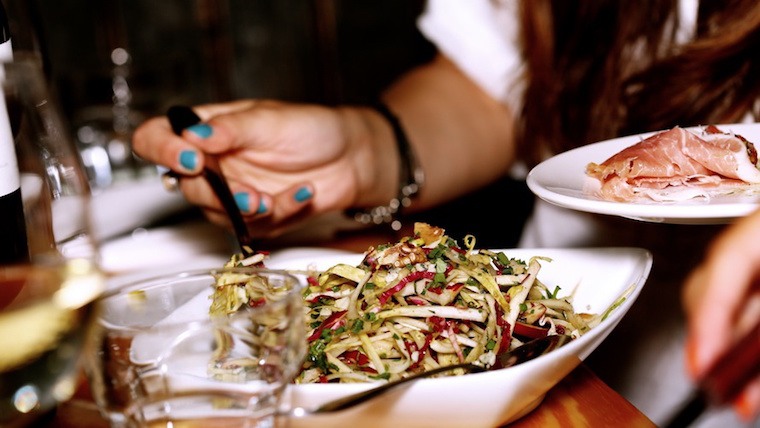"My whole life I was told red meat causes cancer, and had cholesterol and saturated fat, which I was told were unhealthy," she says. "But then I went Paleo [in 2010] and started reading up on it. I started to think, maybe red meat isn't so bad after all."
Tam isn't the only woman who had a bias against red meat. From the aforementioned cancer concerns to a belief that it leads to muscle bulk, many healthy types side-eye filet mignon like it's a carton of cigarettes. (Yes, including Paleo-loving women who stick to their chicken and slow-cooked pork dinners.)
But is red meat truly the wellness world's bogeyman? And is it possible that it might even be—gasp!—good for women to include in their superfood-packed, plant-filled diets?
Well+Good takes an investigative look at red meat—and the relationship women have with it.

About that cancer-causing claim
Registered dietitian and nutritionist Priya Tew wants to set the record straight: Red meat does not cause cancer (an assertion made by the World Health Organization)—as long as it is good quality. "The WHO's claim is mainly around processed red meat and is about the amount of red meat eaten," she says. "Red meat and even processed red meat is not bad for you and is absolutely fine to eat—it is all about eating a sensible portion size, like a four-ounce and not an eight-ounce steak, and not eating it daily." (One review study, which looked at the cumulative results of 35 studies about unprocessed meats’ effect on health, echoes Tew’s statements.)

{{post.sponsorText}}
Tam came to the same conclusion when she started taking a deeper look at the headline-grabbing red meat studies. "The majority of studies that say red meat is bad use high-processed meat, not grass-fed meat, so you really can't take the results as gospel," she says.
The takeaway here: Not all red meat is created equal. Always opt for grass-fed beef, as it’s higher in nutrients and is less likely to harbor food poisoning-causing bacteria, and if you can, shop from a local farm. (Here's our handy guide to understanding meat labels—yes, it can be very confusing.)
Opt for lean cuts (try to get as close to 95 percent lean as you can) of unprocessed red meat, remove any visible fat, and prep it with salt-free seasonings like oregano, paprika, garlic, or chili powder.
The idea that men need more red meat than women is so not true

Even though it's 2016, the image of a man ordering a rare burger for dinner while a woman sticks to a salad is one our culture just hasn't been able to shake. "It harkens back to cavemen days, which is of course ridiculous," Jillian Michaels tells Well+Good.
The tough-as-nails trainer is an investor for Greensbury Market, which sells organic, grass-fed meat and delivers it straight to customers' homes. So yes, Michaels has a stake in eating red meat. She herself eats grass-fed beef once a week, balancing it out with omega-3-rich seafood the rest of the week, she says. As a personal trainer with two kids and an ever-expanding list of businesses, she says she "relies on protein" to get through the day.
"Women actually need far more red meat than men do, because we lose iron every month," she says, recommending women eat one to three servings of 3.5 ounces of red meet a week. Of course, it's full of nutrients both sexes benefit from: protein (duh), zinc, vitamin D, and omega-3s and vitamin B (both of which are good for the brain). It's also high in selenium, which plays a critical role in reproduction—another reason why women need it more than men.
Nutritionist Tew says female athletes in particular can benefit. "Red meat contains protein for muscle repair, for building new cells and proteins," she says. "Zinc, iron, selenium, and vitamin D are all micronutrients that tend to be low in women, so red meat is a good way to ensure you're getting them."
But does it lead to weight gain?

In case you were wondering but too afraid to ask: Eating red meat does not make you fat. (And besides, you look awesome anyway.) It comes from the myth that fat makes you fat.
Tew says if you pick a lean cut, the fat content is comparable to chicken. She notes that it can actually help with weight control because it legit fills you up, so you aren't reaching for something to eat every couple of hours.
For Tam, it all comes down to listening to her body. "I feel better now that I've brought red meat back into my life," she says. "I stay full longer, have more energy, and can concentrate better."
How it compares to a plant-based diet

Even with the popularity of The China Study (here's a cheat sheet), Tew doesn’t believe plant eaters are necessarily healthier than women who eat red meat. “In order for a vegetarian diet to be healthy it needs to be well-planned, since plant proteins do not contain the full set of essential amino acids, and the protein is not as bioavailable as meat,” she says. A study performed last year echoes her sentiments, finding that lean red meat is rich in a variety of nutrients, and increases energy while regulating body weight.
That doesn't mean you have to start eating red meat if you're morally opposed to it. The ethical issue of eating meat brings a whole host of other questions, which is separate from weighing the health pros and cons. But if you do choose to be vegan or vegetarian, you just have to pay a bit more attention to what you're eating to make sure you get the nutrients you need.
Food activist Michael Pollan acknowledges the moral dilemmas of eating meat, but tells Well+Good he chooses to eat it because it supports good agriculture, saying it is more sustainable to have some people eating meat than no one eating meat. "It creates a virtuous cycle of nutrients," he says.
The bottom line if you are a meat-eater? There's no shame in the red-meat game. So go on, throw a steak on the grill.
Need to bone up on your protein knowledge? Here's a whole guide with everything you need to know about the macronutrient (whether you're a meat-eater or not). And if you want to get cooking, these 14 meal ideas all have at least 20 grams of protein from all kinds of sources.
Loading More Posts...